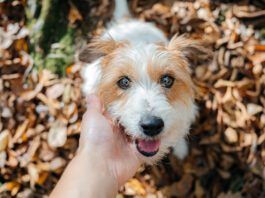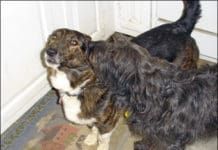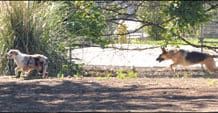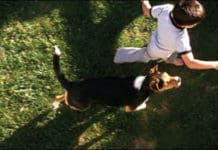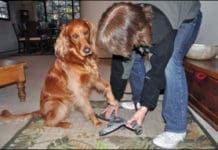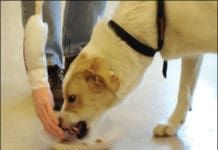It’s Not Your Imagination: Dogs Do Mimic Their Owners
Behavioral scientists have long questioned whether dogs are capable of mimicking each other or people. A recent study published in the Proceedings of the Royal Society B: Biological Sciences has shown that dogs are not only capable of mimicking their owners, they do so automatically. In fact, their drive to copy our head and hand (paw) movements is so strong that they tend to do so even when it is not in their best interests.
Does Your Dog Bite Your Hand While Receiving Treats?
Many of us have dogs who bite down too hard when taking dog treats – this is a canine behavior sometimes known as “hard mouth.” Some dogs take treats forcefully all the time; others get hard mouths only when stressed or excited. One theory is that a hard mouth is a function of bite inhibition – or lack thereof. If a dog doesn’t learn to use his mouth softly during puppyhood, he’s likely to resort to using too much pressure with his mouth throughout his life. But some dogs with acceptably soft mouths take treats hard when stressed or excited. Here are five things you can do when facing a “hard mouth” challenge.
Obsessive Compulsive Behavior in Dogs
Owners of herding and sporting breeds Border Collies, Aussies, Kelpies, Labradors, Goldens, and others often cheerfully talk about their dogs' obsession" with tennis balls. What they really mean is that their dogs are very reinforced by the opportunity to chase a ball. That kind of intense interest in a ball or toy can be useful for training and management purposes
Understanding Highly Predatory Dogs
I remember a day when I was waiting in the vet's office for my dog's appointment. The man sitting next to us started telling me, with beaming pride, about how his little white Westie had caught seven barn rats in the past week. I couldn't help but admire this cute, fluffy dog's superior hunting skills. Predatory behavior in dogs is something I respect. From following a scent trail, to stalking a bird, chasing a ball, or herding sheep, I am intrigued with the many forms predatory behavior manifests in our dogs; it is part of what makes dogs so amazing! But, predatory behavior is not so admirable (and much less socially acceptable), when, instead of it being a country terrier ridding a barn of rats or an Aussie herding sheep, it is your city dog chasing a skateboarder or the neighbor's cat.
Unwanted Dog-Reactive Behaviors
Dog-reactive behavior can be alarming and frustrating for a dog owner, as well as damaging to the canine-human relationship. Most of us adopt our dogs with the hope of sharing them with the rest of the world – on walks, at family picnics, at events around town, and sometimes at canine competitions. It’s not quite as much fun when you have to leave your canine family member at home because he barks, leaps around, lunges at, maybe even tries to bite other dogs.
How To Stop the Dog from Chasing Children
Dogs and kids can be the best of playmates. Sometimes they develop this relationship all on their own, and sometimes they need some outside assistance to become fast friends. It's not uncommon for the basic dog-kid foundation to be solid, with just a few rough edges that need smoothing. One of the common rough spots is when your excited dog wants to chase after and nip your excited children. Here are five things you can do if your canine youngster wants to play a little too roughly with your human youngsters.
Reinforce Your Dog’s Bite Inhibition
My dog bites me. A lot. Scooter, the 10-pound Pomeranian we adopted from the shelter after he failed a behavior assessment (for serious resource-guarding), has bitten me more times than I can count. Most of the time I don't even feel his teeth. He has never broken skin, and the few times I have felt any pressure, it's been because I've persisted in what I was doing despite his clear request to stop. Scooter has excellent bite inhibition. In the dog training world, bite inhibition is defined as a dog's ability to control the pressure of his mouth when biting, to cause little or no damage to the subject of the bite. We know that all dogs have the potential to bite, given the wrong set of circumstances.
My Dog Wakes Up Too Early!
Those last few minutes of sleep before the alarm goes off are a treasured sanctuary where we hide in dreams before the reality of the world intrudes. Few dog owners appreciate their canine pals robbing them of those golden moments. But some dogs seem to have an uncanny knack for anticipating the alarm by 15 or 20 minutes, and manage to routinely do just that. Of course, puppy owners expect to be awakened by their baby dogs or they should. It's unreasonable to think a young puppy can make it through the night without a potty break.
Walking An Excited Dog
You contemplate taking your dog for a walk with mixed emotions. You love the idea of going for a companionable stroll through the neighborhood together, but it's a major hassle to get out the door. When you pick up his leash he becomes the Tasmanian Devil body slamming you, racing around the foyer, and bouncing off the plate glass door with such intensity you're afraid he'll crash right through it.
How to Stop Dogs From Fighting in Your Household
Knowledgeable dog people are quite aware that not all dogs get along with each other, despite the fact that canis lupus familiaris (domestic dog) is a social species. Hey, we humans are a social species, and we certainly don't all get along! Dog-dog aggression is unhappily common in our world. As a professional behavior consultant who works with aggression cases, I probably see more than my fair share of it. By far the most difficult and most distressing presentations of dog-dog aggression are intra-pack aggression cases: dogs in the same family who aren't getting along with each other. I've had a spate of these clients in recent weeks. Even our own Lucy and Missy, a Cardigan Corgi and Australian Shepherd who don't always get along seamlessly, seem to have experienced an increase in relationship tensions this winter.
Should Your Dog Sleep on the Bed with You?
Contrary to the strongly held opinion of some training and behavior professionals, I'm generally pretty comfortable with allowing canine family members on their humans' beds. In our family, two of our five dogs sleep with my husband and me. Scooter, a Pomeranian, routinely sleeps with us; Dubhy, our Scottish Terrier, graces us with the privilege of his presence on our bed only from time to time. Trainers who adamantly oppose dogs on the bed mostly fall into the old-fashioned training camp, and often, they also buy into all the dominance stuff that's been pretty much discredited by behavioral scientists. Chances are good I would differ with them on many dog training and philosophical issues, not just this one. The dog who wants to sleep on your bed isn't trying to take over the world. He just wants to be close to his humans and comfortable!
Unwanted Dog Food Guarding Behavior
Canine resource guarding may be a natural, normal dog behavior, but it’s alarming when your own dog growls – or worse, snaps – at you over his resource. Resist your first impulse to snap back at your dog. Whatever you did that caused your dog to growl, stop doing it. Immediately. If you were walking toward him, stand still. If you were reaching toward him, stop reaching. If you were trying to take the toy or bone away from him, stop trying. Your next action depends on your lightning-fast analysis of the situation. If your dog is about to bite you, retreat. Quickly. If you’re confident he won’t escalate, stay still. If you aren’t sure, retreat.





